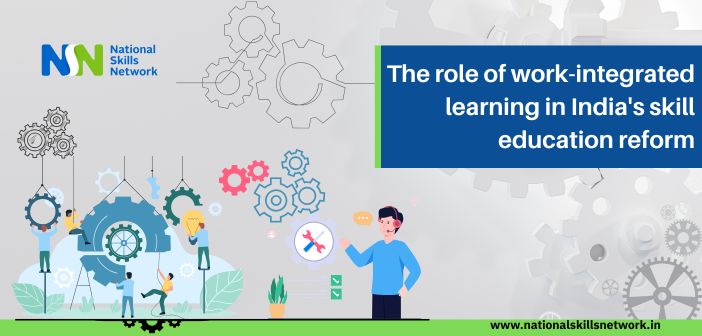India stands on the threshold of a powerful transformation. As we edge closer to becoming a global hub for skilled talent, one truth becomes increasingly evident: our education systems must evolve from being mere knowledge transmitters to career launchpads—and work-integrated learning is key to that shift. The future belongs not just to the educated, but to the employable.
This evolution is already underway—powered by the momentum of the National Education Policy (NEP) 2020, driven by Sector Skill Councils, MSMEs, and visionary educators who are reimagining the classroom as a dynamic conduit to the world of work.
Why work-integrated learning is crucial for future workforce
The separation of academia from industry has long been a structural flaw in our education ecosystem. While students graduate with degrees, employers seek readiness—skills, mindset, and adaptability. The NEP 2020 calls for a tectonic shift: embed vocational elements in mainstream education, foster credit-linked apprenticeships, and make curricula truly responsive to market realities.
Sector Skill Councils have taken this mandate seriously. In sectors like automotive, electronics, and logistics, they are developing modular curricula aligned with the National Skills Qualifications Framework (NSQF), embedding apprenticeships in degree programs, and working closely with higher education institutions to ensure graduates aren’t just employable—they’re irreplaceable from Day One.
These initiatives reflect a broader shift from education for education’s sake to education for employability. They signal the rise of industry-integrated learning as the new standard for relevance, agility, and lifelong career viability.
The silent strength of MSMEs in skilling India
While large enterprises often dominate the dialogue on corporate-academic collaboration, India’s MSMEs are emerging as unsung champions of work-integrated learning. These enterprises, nimble and rooted in real-world problem-solving, offer exactly the kind of applied learning opportunities that today’s students need most.
In a recent dialogue on MSME-academia collaboration, thought leaders highlighted how integrating micro and small enterprises into skilling frameworks could democratize access to practical knowledge. Whether through internships, live projects, or cluster-based training, MSMEs are ideal partners for experiential learning.
The message is clear: to bridge the skill-employment divide, we must look beyond metro-based corporates and tap into the wealth of wisdom held by our MSME networks.
Transformative models in technical education
Across India, a new breed of institutions is quietly redefining what it means to be career-ready. Their model is simple but profound: teach less theory, deliver more application. Education happens in labs, workshops, and simulated industry environments—not just lecture halls.
These institutions foster daily routines that reflect the discipline of the workplace—morning briefings, soft skill development, project-based assessments, and strong codes of conduct. The pedagogy emphasizes “learning by doing,” with students operating advanced equipment and engaging with real-world challenges throughout their course.

What sets them apart is not just technical proficiency but holistic development. Students are mentored to improve their communication, collaboration, and professionalism. They graduate not only with certifications, but with confidence—equipped for both local industry and global mobility through internationally aligned qualifications.
Such models offer a living example of how vocational education, when designed thoughtfully, can uplift individuals from all walks of life—regardless of background, language, or exposure. They represent what’s possible when we align purpose with practice.
Empowering educators: The human link in work-integrated learning
None of this is possible without reimagining the role of teachers. In a work-integrated education ecosystem, teachers are no longer just subject experts—they are collaborators, facilitators, and lifelong learners themselves.
The most successful educators today are those who embrace curiosity and adaptability. Today’s educators must collaboration with industry and leverage technology to bring the workplace into the classroom. They mentor students not just academically, but professionally.
Institutionalizing collaboration, measuring impact
As we move from pilots to policies, from vision to execution, it’s vital to institutionalize industry-academia partnerships. This means creating advisory boards with industry voices, developing micro-credentials that match evolving job roles, and offering students flexible, modular pathways that allow them to learn, work, and return.
It also means making impact visible. Tracking student outcomes, employer feedback, and alumni success can help refine and scale these models, ensuring sustainability.
Work-integrated education is not a side-track; it is the expressway to India’s economic and human capital growth. It is our best shot at building a nation where education does not end with employment—it begins there.
The way forward
In today’s rapidly changing economy, we no longer have the luxury of letting degrees speak louder than skills. What India needs is not just more graduates, but more professionals—self-reliant, future-ready, and globally competent. India’s focus should be on work-integrated learning and skill development.
Work-integrated learning doesn’t just prepare students for jobs but also for change. It transforms institutions into innovation hubs, teachers into career guides, and students into professionals who can thrive anywhere.
It is not merely a policy direction—it is a national necessity.
Let us build this bridge—from chalkboards to circuit boards, from textbooks to toolkits, from aspiration to achievement.
Subscribe to our YouTube channel for more updates:
Subscribe on YouTube



We have establisheda Digital Self Learning center in a village Bordi, Palghar District on the border between Maharashtra and Gujarat to empower young adults “on work-integrated learning and skill development”. How can you help us in reaching out to rural young adults and encourage them to use our non profit facility for “work-integrated learning to prepare students AND transform students into professionals who can thrive anywhere” (your own words in quotation marks). If you are serious about what you preach then please help us put it into practice in RURAL Bharat. Please reply on email ramkiyengar@gmail.com. Dr. Ram K. Iyengar